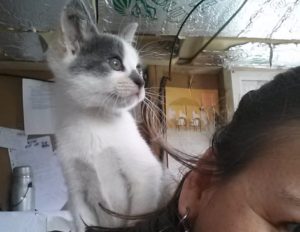
In August I returned to Calais for three months. These three months were extremely busy at times, challenging, inspiring and tiring. I’ve now been back for a little while but I wasn’t ready to write about my experience quite yet, I needed time to process my feelings and emotions.
This is a long post and here is a very important disclaimer: if you are reading this post because you want to read about the numerous hardship refugees have had to go through, you will not find it here. The reason is quite simple, there’s already multiples articles about just that and I do not want to promote any of that voyeurism. To you, it might be only a story, but for the people who live in the refugee camps, it’s one of the most difficult times of their already impossibly hard lives. And it’s not my place to share other people’s personal stories. They are very capable of doing so themselves should they actually want to. And they should have the option of moving on if that’s what they want. For the same reasons I wouldn’t ask you to tell me about one of the most difficult times in your life until we reach a certain point in our relationship, I will also provide the same respect to my refugee friends.
Being in Calais and volunteering with tonnes of other volunteers trying to help fellow humans by providing the basics was extremely humbling, inspiring and very difficult mentally, physically and emotionally.
Just like the first time, I find myself so unbelievably lucky to having been born in a peaceful country, to be holding a passport that allows me to move freely in and out of a lot of countries. I’m so lucky I don’t really have to worry about my friends and family’s safety, they all mostly live in stable countries. When they don’t reply to my messages or call right away, I’m not afraid the message they had sent me previously might have been the last one because their country is being bombed. Or because there’s now famine spread all across their country. Some of my friends are not as lucky, though. And I honestly do not know how they cope. They are the strongest most inspiring humans I know.
To now be in London, just before Christmas, and seeing everyone busy with their holiday shopping makes me want to scream. I do restrain myself from doing that because a) it would look really weird and b) I remember that this is how it should be. People should be worried about what do buy their friends or loved ones for Christmas, how they will introduce their parents to their new partner, not if they will still be alive tonight.
Being in Calais was inspiring by the sheer amount of simply amazing and resilient people I’ve met, both refugees and volunteers. People managing to somehow still smile and be hopeful gave me hope for a better future. Volunteers giving all their energy to help fellow humans. That was inspiring. But also very difficult. I was balancing contradictory emotions every day. Amazed at how strong people are and bewildered at how such a situation could even happen in the first place.
I’ve said it before and I’ll say it again, we are all humans and we all deserve to be safe and happy. No one deserves to have their country torn to bits. Just because we happen to be born in a stable country doesn’t give us any more rights to happiness and safety than others.
It’s been very nice to meet people with similar values lately. A lot of the volunteers were younger but there was also a fair amount of older people. The diversity of backgrounds, ages and walks of life was amazing. And the fact that we all decided to do something and go to Calais is encouraging.
Long and difficult days
I was in Calais last winter, so I knew that coming back as warehouse manager was going to be very challenging. The mornings were always quite hectic until about 10:30 and then it was a lot more sustainable rhythm.
My responsibilities were to make sure that we were using the humans and material resources to the best of our ability. That meant doing the morning briefing, explaining to all new volunteers the rules about the warehouse, why we weren’t sending everyone into camp just to see it, and try to find the right volunteers for the right jobs all while ensuring the stock that needed to be sorted was indeed sorted.
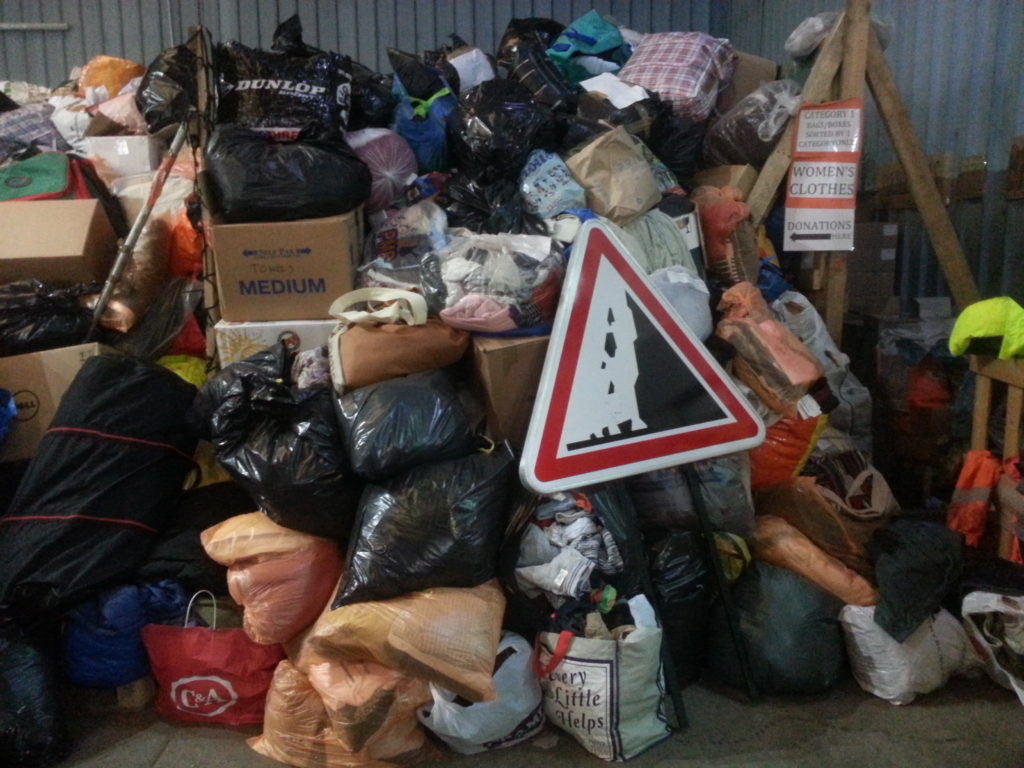
The first challenge about this part of the job was to show enthusiasm every day, rain or shine, tired or not. It was also confusing most days to work out how many volunteers were going to show up, or how much and what kind of donations we were going to get. Dealing with so many unknown values every day was sometimes puzzling. It did however mean, there was never two days which were the same.
Another sometimes difficult task was to be working with other extremely tired volunteers trying to make the best of what very little donations and energy they had left. Communication is key in such challenging environments, but it’s also usually the first thing to disappear when things get tough.
Coming back to the position of warehouse manager meant I had a lot more pressure on my shoulders than the first time around. People now had expectations. I had to do a good job. And the person I was replacing had been there for over a year. Those were massive shoes to fill. She knew absolutely everything, had learned how to deal with difficult volunteers, how to be inspiring every day, how to deal with the unannounced journalists fishing for juicy information to share, etc. A lot of things I knew nothing about. Managing stock and people is what I felt somewhat comfortable with. Everything else was new.
The job in itself meant there were so many things to take care of and ultimately decide on.
Some days I had to remind myself, that as I would tell anyone in this situation, one issue at a time and one day at a time.
Most days I succeeded in dealing with the stress by breathing and reminding myself we were already doing amazing things and I couldn’t be expected to be doing miracles. But sometimes, people would come up to me and reminded me of the fact that I had a lot of weight on my shoulders. They would usually mention that when I would have managed to focus on the task at hand and forget about my stress. When people started pointing it out to me, I would suddenly get really nervous. Otherwise, I would plough through and get as much done as possible.
You’ve got to love people
The best and most difficult part of the job was dealing with too many or too little donations and volunteers.
Most volunteers coming to Calais were expecting to go to camp. While I did understand their need to see it from their own eyes, it was very challenging to explain why it was not necessarily a good idea. Telling people that because they were curious to learn about the refugee’s journeys didn’t mean they were entitled to ask questions. It’s not always easy to understand how detrimental it could be. And while most people understood why we were only sending long time volunteers into camp, every day I had to have the same conversation over and over again. It was hard for people to be able to put their curiosity aside and not treat this like a zoo. And to understand it was not an integration experience.
We were simply providing things that would bring a certain comfort to the refugees, mostly in the form of hot meals, kitchenware so people could have some independence and cook their own food, clothes, tents, bedding and hygiene products.
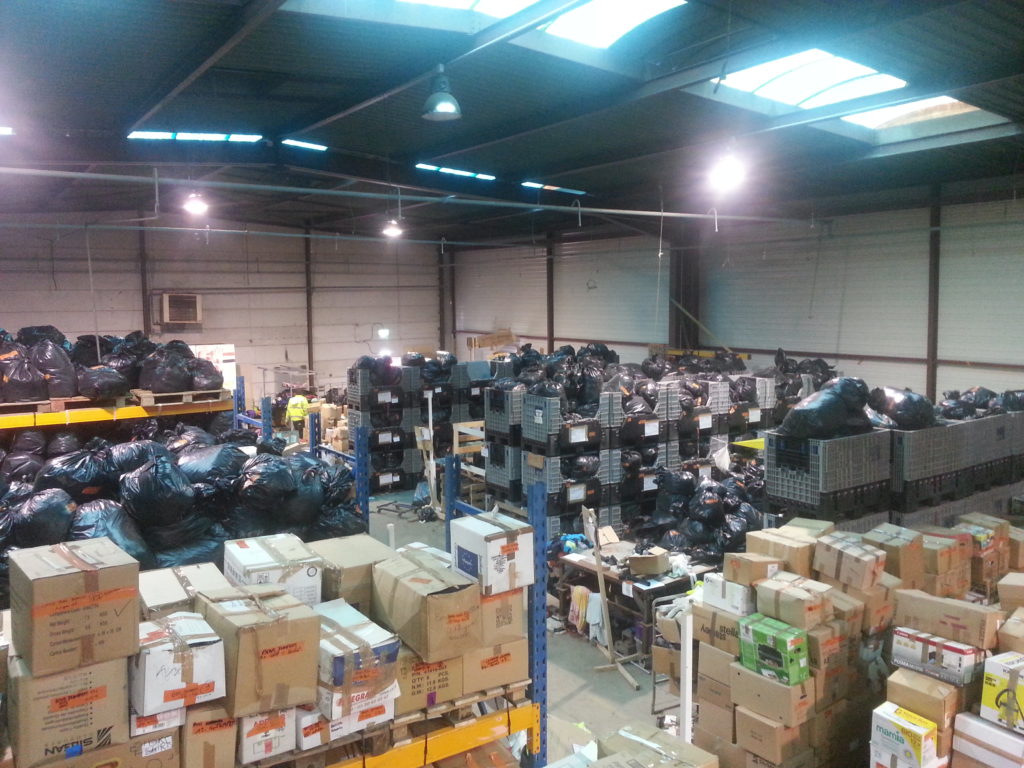
Some days we had barely any donations coming in and it made it very difficult to give satisfying jobs to volunteers. Finding the balance between asking people to work hard on sorting things, and also providing a changing and interesting environment so short-term volunteers would like their experience enough to either stay longer, come back or tell their friends was an everyday challenge.
Working with people day in day out was so enriching and at the same time so frustrating. And if I’m being totally honest, some days it felt a lot more on the edge of frustrating.
At the warehouse, I quickly learned that personal space didn’t really exist. Everyone would hug and touch all the time and I think it was part of our mechanism to cope mentally and emotionally. Not being a very touchy kind of person, it took some time, but I grew to like it and I rapidly became a lot more comfortable with that. I even ended up being the one to initiate hugs.
It was very easy to get caught in the daily challenges and forget how amazing this whole experience was. Some volunteers came back, and one, in particular, made me feel a lot better. She had been in Calais for a long weekend and had done a great amount of work and helped me immensely. When she came back, she made my day when she told me why she had decided to come back. It was thanks to the coordinators. She liked the fact that we were down to earth while getting shit done. It was such a nice compliment. It fueled me with energy for a few days.
Unexpected difficulties
Some of the things I found especially difficult to deal with was journalists. I’ve never had media training so I find it very hard to know what I can and can’t say and how to be effective, yet inspiring and able to shine the light on dire situations.
One thing that drove me absolutely nuts was dealing with the journalists who didn’t follow the normal procedures and protocols, instead simply showing up and expecting me to be able to find someone to drop what they were doing and take them on a tour of the Jungle. As if it was an attraction. There’s a thin line between balancing the media image and keeping the focus on what we were there to do. Providing help to refugees, all while being aware we needed the medias to be there covering the situation in order to get further help. This was very challenging for me. Most days someone else was doing this part, but sometimes they were either busy or away and I had to step in.
Making sure the volunteers were taking some time off and not burning themselves was also another unexpected part of the job. It was hard to remind myself and others that as unfair as it sounds we can’t save everyone and, sometimes you have to learn to be okay with that. And there’s no point in ruining our health, both physical and mental, to help anyone else. It’s never worth it and we should always be our only priority.
At one point I felt like I was spending most of my days talking to people and telling them, (and sometimes arguing) to take their fucking days off. I don’t really know when my focus somewhat changed to volunteers well-being but I did feel some responsibility in ensuring the volunteers were also taking care of themselves. It must have been my mum or teacher side. I thought back to my days working in the school and remembered that leading by example is always the best policy. So I took my own days off in order to stop feeling like a fraud!
Working in a humanitarian situation, in an area where there are many different organisations working meant that there’s also tonnes of meetings and politics to deal with. Whether you want it or not, there’s always other people with different agendas. I’m glad this was not the main part of my work, however, I attended my fair share of inter-associations meetings. While I did like the meetings were we all kept our focus on improving the refugees’ situations, sometimes I struggled with all the political greed. Some organisations did end up working really well together, sharing volunteers and that was lovely. A nice break from all the drama.
Speaking of drama, as not everyone agreed with what we were doing, sometimes volunteers would leave the warehouse at the end of the day and have a very unfortunate surprise in finding their car with smashed windows. Smashed windows were rather annoying, especially when you call the police and they end up telling you it must have been ”some of your black friends”. Some of the police officers were very nice and civil, but it was definitely not the case for all of them and this was a highly inappropriate comment coming from people supposedly here to serve and protect.
Sometimes, though, the bad surprised were taken to another level. One day, a volunteer went to leave only to find out that some people had taken one of her wheels off, including all the bolts in order to make sure she couldn’t simply use her spare tire. Very frustrating when we were simply trying to help fellow humans.
One afternoon while a well-known celebrity was there filming to bring more awareness to the situation, someone came up to me. They needed to talk to me without delay. I was expecting some issues with deliveries, that our distribution teams needed extra blankets, or maybe even that there had been yet another fire and we needed to put together emergency packs. Little did I know it was a lot more disgusting than that. They had discovered a bag of eyeballs in a bag of shoes to sort. A full freezer bag of cow or sheep bloody eyeballs. And of course the plastic bag had punctured and there was now blood and other liquids all over the shoes. That was a first. And thankfully the only incident this gross.
Some highlights
I didn’t go to camp as much as I would have liked, but as I kept telling people it was not a tourist attraction and I had loads of work to do in the warehouse, I couldn’t possibly justify going to camp without a job to do. Once again leading by example.
One time that I went, though, I joined the women’s and children’s distribution team. As you can imagine, it can be quite challenging and demanding, and rather humbling to distribute clothes and hygiene product. Because we rely almost solely on donations, not all the products are equally interesting and that sometimes can, understandably, create tensions. The girls running the women and children bus were simply amazing, knowing almost every single refugee and their kids by name, knowing what they liked and what they didn’t. Having clearly spend a lot of time getting to know the women. During the distribution, some women came in with their kids, to get some stuff for the little ones, but also because there’s nowhere to leave the kids. As I was stationed at the first stop, I played babysitter with some kid so the mums could have their hands free to find some clothes for themselves. It must be really hard being a mum in camp as you can’t have any alone or quiet time. While I was playing with three little girls, the smallest one wanted in my arms so I took her and she fell asleep. It was adorable and heartbreaking. I truly admire the women in camp to be able to put up with all of the hardship that comes with living in a refugee camp. There are the strongest most beautiful people I’ve met.
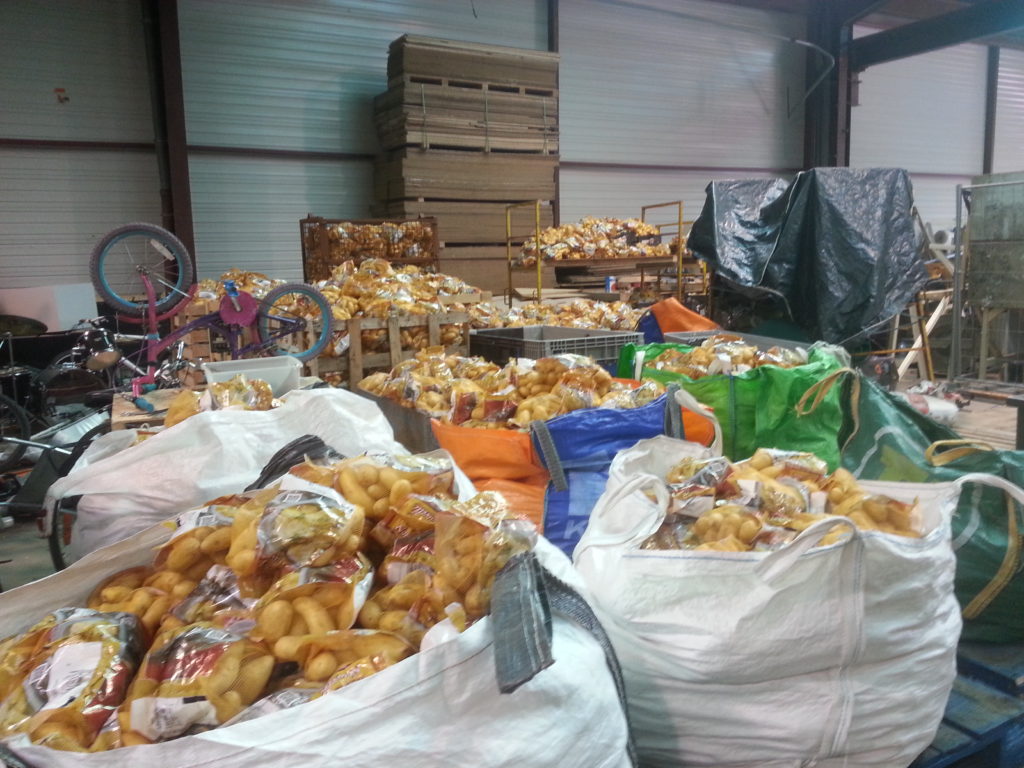
Another moment that’s been engraved in my memory is seeing the warehouse and all we do through the eyes of someone who used to live in the camp. It was so touching. He came in with one of the ladies that has been helping out in Calais for years, so I took him on a little tour of the warehouse. We went through the Refugee Community Kitchen (providing daily hot meals), the Calais Kitchens (providing food packs so people could make their own food), the Calais Woodyard (processing firewood so refugees could stay warm and cook their food) and the warehouse with all our different sections (tents, bedding, hygiene products, clothes, shoes, school supplies, etc). Seeing through his eyes all the work that was put together in order to send every specific item into camp, noticing the many volunteers giving their time to make a difference, noticing all the different countries represented, it was very impressive. Because it was my new normal, I had forgotten how amazing it was that a lot of people came in to volunteer just because they actually cared about their fellow humans and wanted to help and do something.
Learning a great deal about what I can and can’t do
Coming to Calais and facing new challenges means that I’ve learned a lot about myself. I’ve become a lot more confident and comfortable in how I deal with criticism and ideas. I also realised I gained a lot of maturity and experience in the last few years and it was very important to be able not to take stuff so personally anymore.
I’m proud of myself to have been able to admit when I needed time off and also when I needed help. And being able to say: I don’t know. In line with the fact that I’m really trying to be honest with myself and others and set an example of not being afraid to admit some things are very difficult for me, this was a great opportunity for personal development as well.
I also did realise while talking to others that I do have some healthy reflexes now when it comes to mental health. It’s far from perfect but I do know myself now and I can see that I have changed a lot and learned from my previous experiences. From advising people on how to best deal with others, seeing why some stuff annoys me and trying to understand the emotions associated with the problems, learning to admit that I don’t know, or admitting what is not my strength, I’m more and more becoming a fairly stable and well put individual. Mentally that is. I’m proud of how far I’ve come and it motivates me to keep going.
Helping others can become addictive
Some people seemed to become dependent on helping others. It does allow you to forget all about your own life since you are so busy taking care of other people. It is good to help but it’s good to be able to stop and remember why you are doing it. If you are helping to run away from your own problems, it might be a good option to deal with your own issues also!
One more thing I really liked about Calais was that because we were working as a team we could actually take some time off. And even though it can be hard to admit, everybody is easily replaceable even though no one likes to think that way. But in such a situation, it’s great. It means that great things will continue to happen once you are gone since other lovely humans will step in and take on the responsibilities.
Catching up with the Calais family afterwards
That’s has got to be another one of the best aspects of my experience in Calais, I’ve met some amazing people, truly inspiring individuals wanting to make this world a better place and caring for their fellow humans. It also means that when we catch up, we can talk about anything, from the most trivial subject to the more in-depth conversations I love so much.
I’ve met up with some of the volunteers since coming back to London and I realised that besides being in Calais at the same time we had absolutely no other interests in common, which is totally normal, but there’s a few where when we met again, we realized we had tons of other interests in common, and actually really enjoyed each other’s company.
This is by far one of my favourite things about the experience. While in Calais we were all so busy we barely had any time to talk about our own personal lives, to meet up in the ”normal” world means we still have tonnes to learn about each other. So not only did we all meet inspiring humans, but it’s easy to become good friends since we shared that bond and that experience together.
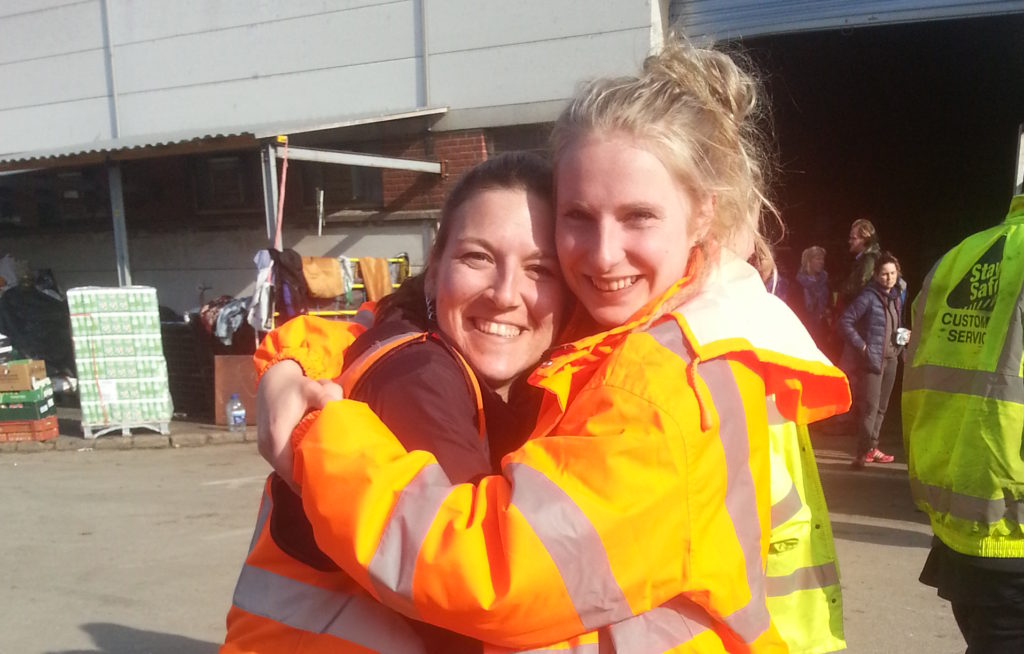
The situation is still very difficult in France and in refugee camps around Europe. Now that the Jungle is closed, a lot of people mistakenly assume that there’s no more need for volunteers and donations, but it couldn’t be any further from the truth. The Help Refugees and L’auberge des Migrants warehouse in Calais no only still provide for the camp in Grande-Synthe, they also work hand in hand with other organisations in Paris and regularly send stuff to the teams in Greece, Lebanon and Syria.
We can no longer stay silent and let stuff happen to other humans. We can’t ignore it any longer. If you are like me, use that frustration as fuel to keep you going. Fund raise money, donate clothes, look around you: there’s always people who could benefit greatly from an extra little bit of help. Maybe there’s a family you know that could benefit from a home cooked meal, or maybe there are students at your child’s school who will not have anything to eat over Christmas.
If you can and want to make it to Calais, Greece, Lebanon or other places, that’s great. But don’t use the excuse that you don’t have time or money to do something. There are tonnes of organisations that always need volunteers and donations. Do your research to find one that has values in line with yours and get involved.
Wanting to Choose Love and donate time, money or clothing to Help Refugees and l’Auberge des Migrants? Head up here.
You did a truly amazing job! I tried to help Lauren a bit once the eviction was over and found it so hard to focus, but even harder to keep up the friendly face that you maintained at all times. It was so impressive! We missed you horribly. I’m glad to have passed it all over to a fresher faced team to be honest, but I do miss the warehouse every day.
Thank you Katie, you are such an amazing and inspiring woman. Don’t sell yourself short! I’m also really happy you have finally passed it all over to someone else too 😉 I miss the warehouse and you guys. Let’s catch up soon xx